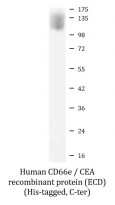ARG70322
Human CD66e / CEA recombinant protein (ECD) (His-tagged, C-ter)
Human CD66e / CEA recombinant protein (ECD) (His-tagged, C-ter) for Binding Activity,SDS-PAGE and Human
Overview
| Product Description | HEK293 expressed, His-tagged (C-ter) Human CD66e / CEA recombinant protein (ECD). |
|---|---|
| Tested Reactivity | Hu |
| Tested Application | Binding, SDS-PAGE |
| Target Name | CD66e / CEA (ECD) |
| Species | Human |
| A.A. Sequence | Lys35 - Ala685 of Human CD66e / CEA (NP_004354.2) with 6X His tag at the C-terminus. |
| Expression System | HEK293 |
| Alternate Names | Carcinoembryonic antigen-related cell adhesion molecule 5; CEA; CD66e; CD antigen CD66e; Carcinoembryonic antigen; Meconium antigen 100 |
Application Instructions
| Application Note | Binding activity test: Measured by its binding ability in a functional ELISA. Immobilized Recombinant Human CEACAM5 at 5 µg/ml (100µl/well) can bind Recombinant Human CEACAM8 with a linear range of 0.5-3 µg/ml. |
|---|
Properties
| Form | Powder |
|---|---|
| Purification Note | 0.22 µm filter sterilized. Endotoxin level is <0.1 EU/µg of the protein, as determined by the LAL test. |
| Purity | >95% (by SDS-PAGE) |
| Buffer | PBS (pH 7.4) |
| Reconstitution | Reconstitute to a concentration of 0.1 - 0.5 mg/ml in sterile distilled water. |
| Storage Instruction | For long term, lyophilized protein should be stored at -20°C or -80°C. After reconstitution, aliquot and store at -20°C for up to one month, at 2-8°C for up to one week. Storage in frost free freezers is not recommended. Avoid repeated freeze/thaw cycles. Suggest spin the vial prior to opening. |
| Note | For laboratory research only, not for drug, diagnostic or other use. |
Bioinformation
| Gene Symbol | CEACAM5 |
|---|---|
| Gene Full Name | carcinoembryonic antigen-related cell adhesion molecule 5 |
| Background | This gene encodes a cell surface glycoprotein that represents the founding member of the carcinoembryonic antigen (CEA) family of proteins. The encoded protein is used as a clinical biomarker for gastrointestinal cancers and may promote tumor development through its role as a cell adhesion molecule. Additionally, the encoded protein may regulate differentiation, apoptosis, and cell polarity. This gene is present in a CEA family gene cluster on chromosome 19. Alternative splicing results in multiple transcript variants. [provided by RefSeq, Jul 2015] |
| Function | Cell surface glycoprotein that plays a role in cell adhesion, intracellular signaling and tumor progression (PubMed:2803308, PubMed:10910050, PubMed:10864933). Mediates homophilic and heterophilic cell adhesion with other carcinoembryonic antigen-related cell adhesion molecules, such as CEACAM6 (PubMed:2803308). Plays a role as an oncogene by promoting tumor progression; induces resistance to anoikis of colorectal carcinoma cells (PubMed:10910050). (Microbial infection) Receptor for E.coli Dr adhesins. Binding of E.coli Dr adhesins leads to dissociation of the homodimer. [UniProt] |
| Cellular Localization | Cell membrane; Lipid-anchor, GPI-anchor. [UniProt] |
| Calculated MW | 77 kDa |
| PTM | Complex immunoreactive glycoprotein with a MW of 180 kDa comprising 60% carbohydrate. [UniProt] |
Images (1) Click the Picture to Zoom In






